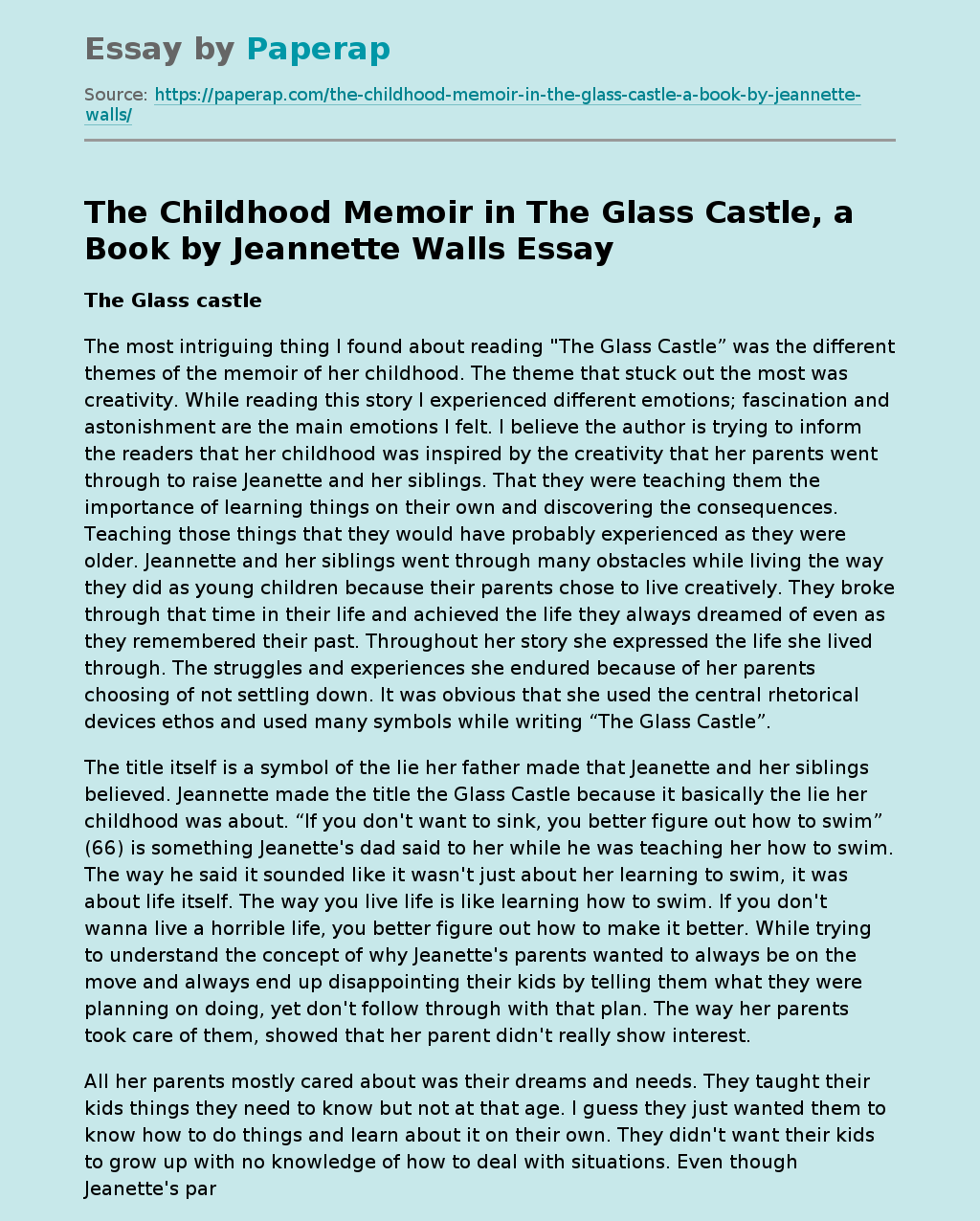The Childhood Memoir in The Glass Castle, a Book by Jeannette Walls
The Glass castle
The most intriguing thing I found about reading “The Glass Castle” was the different themes of the memoir of her childhood. The theme that stuck out the most was creativity. While reading this story I experienced different emotions; fascination and astonishment are the main emotions I felt. I believe the author is trying to inform the readers that her childhood was inspired by the creativity that her parents went through to raise Jeanette and her siblings. That they were teaching them the importance of learning things on their own and discovering the consequences.
Teaching those things that they would have probably experienced as they were older. Jeannette and her siblings went through many obstacles while living the way they did as young children because their parents chose to live creatively. They broke through that time in their life and achieved the life they always dreamed of even as they remembered their past. Throughout her story she expressed the life she lived through.
The struggles and experiences she endured because of her parents choosing of not settling down. It was obvious that she used the central rhetorical devices ethos and used many symbols while writing “The Glass Castle”.
The title itself is a symbol of the lie her father made that Jeanette and her siblings believed. Jeannette made the title the Glass Castle because it basically the lie her childhood was about. “If you don’t want to sink, you better figure out how to swim” (66) is something Jeanette’s dad said to her while he was teaching her how to swim.
The way he said it sounded like it wasn’t just about her learning to swim, it was about life itself. The way you live life is like learning how to swim. If you don’t wanna live a horrible life, you better figure out how to make it better. While trying to understand the concept of why Jeanette’s parents wanted to always be on the move and always end up disappointing their kids by telling them what they were planning on doing, yet don’t follow through with that plan. The way her parents took care of them, showed that her parent didn’t really show interest.
All her parents mostly cared about was their dreams and needs. They taught their kids things they need to know but not at that age. I guess they just wanted them to know how to do things and learn about it on their own. They didn’t want their kids to grow up with no knowledge of how to deal with situations. Even though Jeanette’s parents run away from their problems, they encourage their kids to face their problems. Even if her parents are not that great of parent, they do have love for their kids. There is no such thing as perfect parent. Every parent have their flaws, it just happens to be Jeanette’s parent’s flaw of not wanting to settle. They move around a lot yet they think of it as an adventure.
Even as they live in run down places they make the most of it. It intrigues me that Jeannette and her siblings throughout their child seem to accept that they don’t have a place to actually call their home. It makes sense that they would call their family home. But it seems as if Lori and Brian get tired of their “adventures “of being in new places. When they were living in the desert and Jeannette and her mother Mary Rose were talking about the symbol the “Joshua Tree”. Her mother said “You’d be destroying what makes it special’ she said, ‘It’s the Joshua tree’s struggle that gives it its beauty” (38). I found that fascinating. Any regular person would have not thought like that. But of course Mary Rose was an inspired artist so her thoughts would be like that. The father however he has his mind set on building the Glass Castle. I just don’t get how he planned to do that when he couldn’t even keep his jobs. Building a prospector that he says would get him rich was easy to believe but after reading on and seeing as he doesn’t do things he says he would. And any jobs he gets he ends up ruining it by doing dumb stuff. He is a character that doesn’t always follow through with what he tells people. He is great at building things but I believe he has a mindset of not believing in what he wants or in fact probably doesn’t even care.
The Childhood Memoir in The Glass Castle, a Book by Jeannette Walls. (2021, Dec 15). Retrieved from https://paperap.com/the-childhood-memoir-in-the-glass-castle-a-book-by-jeannette-walls/

